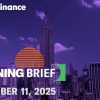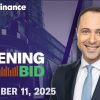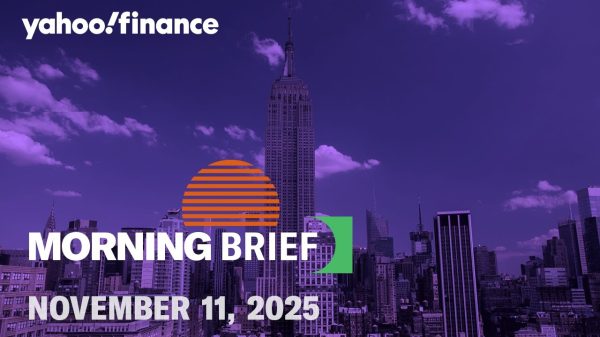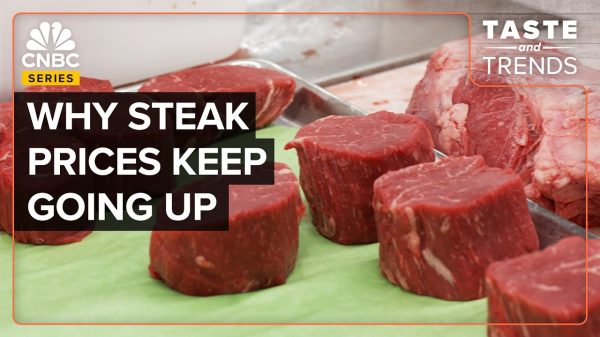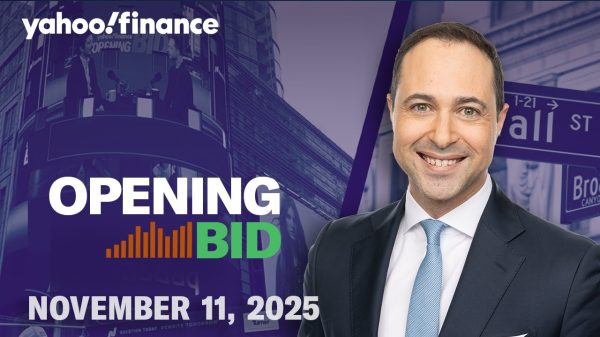PayPal Holdings, Inc. (NASDAQ:PYPL) Goldman Sachs Communacopia & Technology Conference Call September 7, 2023 4:00 PM ET
Company Participants
Dan Schulman – President & CEO
Conference Call Participants
David Solomon – Goldman Sachs
David Solomon
So good afternoon, everybody, and welcome, Dan. Welcome. I’m thrilled to have Dan here. I don’t think needs a big introduction, the President and CEO of PayPal. Dan joined PayPal in 2014 to lead the organization, following the separation from eBay. And over that time, you’ve grown PayPal into a leading two-sided payment network with more than 430 million consumer and merchant accounts.
And so as always, I appreciate you being here, Dan. So thank you.
Dan Schulman
Great to see you, David. Thank you.
Question-and-Answer Session
Q – David Solomon
Good to have you here. So earlier this year, you announced your intention to retire at the end of 2023, and you recently announced your successor, Alex Chriss. So unfortunately, this is going to be the last time I probably have the privilege of doing this with you in a public setting. We’ve done a number of times but this will be the last time. Under your leadership, obviously, you’ve grown the active accounts, I think, more than double to over 430 million. I think that’s a 13% CAGR.
The payment volume, I think, is CAGR at about 25%. You’ve grown revenue and EPS in high teens kind of annually. And so we can’t do a full walk-through on all this, but I’d just like you to reflect a little bit kind of on the experience and where you are and kind of how you feel as you kind of pass the organization to the next leader.
Dan Schulman
Yeah. First of all, I’m glad you’re doing my last interview as well. You’re a good friend and I couldn’t respect you more, and so thank you. And it’s great to be with all of you.
Look, I think it’s always hard doing a transition but it was absolutely the right time to go do that. The board did a fantastic job in finding Alex. The more I get to know Alex and we talk multiple times a week, the more I find him to be an inspiring leader and somebody that is going to take PayPal to the next level. He’s really truly a great guy and a ton of experience.
I think as I look back on PayPal, I think probably the biggest thing that we were able to do is go from being kind of a frenemy with the emphasis on enemy, financial institutions around the world when we first started, to really becoming the largest digital distribution channel for FIs around the world. And that was really this whole idea of giving consumers choice on what funding instrument to use inside our wallet as opposed to steering them to a low-cost instrument.
It was a really controversial decision when we made it. A lot of people thought that our margins were going to come down. That was going to be a really difficult decision, but I felt like putting the customer at the center of everything we did had to be the right decision for us.
And to your point, it unlocked everything. I mean, our revenues tripled from $8 billion to about $30 billion. Our volumes quintupled from $300 billion to $1.5 trillion this year. Our EPS quadrupled. We did about $1.25 the first year we went public. This year, we’ll do about $5 of EPS. Our free cash flow tripled as well from about $1.5 billion to about $5 billion.
And all of that, by the way, while diversifying away from eBay. When we split from eBay, eBay was about 20%-plus of our revenues, probably about 35% to 40% of our profits. And today, that’s less than 2% of our revenues, less than 2% of our profits. So all of that happened while diversifying and really kind of unleashing customer growth and metrics that I don’t think anybody really would have imagined would have been possible when we first started off.
David Solomon
Yeah. One of the things that I know you’ve been focused on over the course of last year is kind of focus on priorities. And you narrowed your focus to three strategic priorities, which we can go through a little bit, improved core checkout, grow PSP, drive adoption in digital wallet. I’m a big believer that focus enhances the ability of big companies to execute.
Before we kind of talk about each of these in a little bit more detail, why did you decide to prioritize these three? And how do they complement or relate to each other? And how is that prioritization helping with better execution of the company?
Dan Schulman
I agree completely with you and I think most CEOs would agree as well. The more you can focus your organization, the better they’re going to execute. I mean, big organizations don’t do hobbies well. They really need to focus on, what are the important things? What are the key drivers? What’s the bread and butter of your organization? It doesn’t mean that you don’t experiment, right? Like we both try to innovate.
Sometimes things work out, sometimes they don’t. We do basically 150 to 200 experiments a quarter, of which one third work, two thirds don’t work. But that one third, that work starts to multiply and there’s some cumulative effect of that really plays out into your results.
So you take innovation. Innovation is always a two-edged sword. Sometimes it works, sometimes it doesn’t. That’s what innovation is about.
David Solomon
Absolutely.
Dan Schulman
And by the way, when you don’t — when it doesn’t work, you shut it down. You do the same thing. And that’s one of the things I really respect about you. You take chances. When they work, you double down on it. When they don’t, you shut it down and have the courage to go and do that. That’s not always an easy thing to go and do.
So I think the fact that we focus on three things: growing our share of branded checkout, that’s our bread and butter. That’s our highest margin business. Doubling down on our unbranded or our PSP platforms. We’re having tremendous success on that, which by the way, kind of doubles down on our checkout again because when we implement our unbranded or our PSP platforms into merchants, they automatically upgrade to our latest checkout integrations.
And of course, having a digital wallet. We have over 200 million consumer accounts that use our digital wallet. It’s one of the largest digital apps or digital financial apps in the world, perhaps the largest in the Western world. And there, people use checkout 30% more, they churn 25% less. So really focusing on those three things, they both are intertwined and sort of inextricably linked together. And if we do well on one, the others start to accelerate as well.
David Solomon
Yeah. You’ve got a great — because of your position in online checkout, you’ve got a great view across e-commerce globally, consumer spending trends. What are you seeing in the current environment? How are you seeing consumer spending habits evolving?
Dan Schulman
The consumer has been pretty resilient. I think everybody has seen that, but — and you guys have been pretty bullish on it being a soft landing coming up. I think the Fed has done an excellent job actually in raising rates in a controlled way. Inflation is starting to come down. But I do think the consumer is somewhat fragile right now. And I think that we still are not out of the woods by any stretch of the imagination.
The pandemic benefits are running out. People put those in their savings. Savings accounts are coming down quite meaningfully. Credit is at an all-time high right now. You’re beginning to see credit defaults tick up a little bit. And so I would say the consumer is fragile. I would say the economy is moving in the right direction, but it’s fragile here in the U.S. And I’d say the EU is still working its way through, just barely growth…
David Solomon
Certainly much more sluggish than here.
Dan Schulman
Yeah, exactly. And I think they’ve got a longer road to hold. So I think in general, I think you’re beginning to see discretionary spend begin to rise a little bit as inflation comes down. I think revenge travel, I think we’ve seen the peak of it. And I think as you look out into fourth quarter and into next year, I think you’d probably start to see travel, entertainment, ticketing start to slow probably a little bit.
David Solomon
Yeah, yeah. It’s not inconsistent with my own view. On branded checkout initiatives and you’ve done a ton of innovation, constant innovation, constant iteration. When you look at the innovation, the iteration, the tweaking, how is that affecting the customer merchant — the consumer merchant experience? Can you give some specifics around how you see that impact?
Dan Schulman
Yeah. Well, as you know, there’s never a one silver bullet of facts and everything. Branded checkout is hundreds of things that you need to go do and you need to do well. Basically, on branded checkout, we’re basically trying to take friction out of the process. So that is reduced latency, make sure that everybody has a one-click checkout, passwordless login, native in-app experiences.
So when somebody comes in to a merchant app, they don’t bounce out to the PayPal server farm and then bounce back in when they’re checking out. It just adds time and confusion. And we’re making slow but steady progress on all of that. 70% of all checkout now is passwordless outside of the EU. EU, you still have SCA, strong customer authentication. But we’re rolling out passkeys hard and heavy into the EU, and that will create a biometric passwordless approval process in the EU as well.
We’ve got 43 of our top 100 merchants now in our latest checkout. We said we’d be at 50% by the end of the year as sort of an aspirational goal, and we’re in pretty good shape on that right now. And we’re rolling out very aggressively all of our PSP platforms, whether it be Braintree, and I’m sure we’ll talk about that later, or PPCP, our unbranded platform for SMBs and channel partners. That’s gaining a tremendous amount of traction. And everywhere we roll that out, you’re automatically on our latest and greatest checkout solutions.
And when you’re on our most upgraded checkout solution, we either gain or hold share, worst case.
And then we’ve got other things that we’re putting into place like Buy Now, Pay Later. We launched it two and half years ago. We’re clearly a top three player in the world. I’d argue we’re probably the number two player in the world. And the U.S., that we’re probably number one in the U.S. And everywhere we have Buy Now, Pay Later, especially when we have it upstream from the checkout page, we gain a large amount of share on that. So there’s a lot of things we’re doing on branded checkout, a lot more that we’re going to continue to do.
David Solomon
Is there more innovation that you think can come there, a meaningful more?
Dan Schulman
Yeah, for sure, there is. As I mentioned, I will do 200 separate experiments on — mostly on checkout this quarter alone. Again, I hope a third of them are successful. But each and every one of them moves the needle for us. And we’ve got some bigger things like we’re combining on our app like shopping tools as well as payments.
We have over 10 million consumers enrolled in our rewards programs right now. And their incremental volume is 32% when they do that. That’s — so these kinds of things, when you can combine them together, can make a real big difference in both how a customer looks at PayPal overall, how they shop and their whole checkout experience. So a lot more to do on that front.
David Solomon
Let’s switch gears, talk about PSP, the PSP part of your business. You mentioned PPCP, PayPal Complete Payments. Talk a little bit about what it is and how big an opportunity this is for you and why now.
Dan Schulman
Yeah. Well, it’s a huge opportunity for me. It’s an extremely large TAM. Most importantly, though, it is a market we have not really touched with products in a long time. We’ve spent years developing PPCP. We just rolled it out. It will be fully rolled out through Europe as well as the U.S. and certain select markets in APAC. And it’s focused, it’s our unbranded PSP platform for small businesses and channel partners.
It’s going right at — that’s been the PSP in that market. We’ve had a tremendous initial success there. We’ve got Shopify, Woocommerce, Adobe, 25 other channel partners signed up to roll out PPCP. We’ve got 2.5 million merchants with one click can move over to PPCP. We’ve rolled out our third wave of enhancements already. We rolled that the third wave just 3 days ago. And so it’s a best-in-class PSP platform, tremendous opportunity for us. And down market, you have very high margins as well.
And so when you’re up market, especially in the U.S., it’s pretty much commoditized on that payment side, very low margin business. Now there are ways of increasing margin on that. But down market, when you’re in — even in the U.S. and especially overseas, it’s a high-margin business for us.
David Solomon
Yeah. On the other end of the spectrum, you’ve got Braintree, where you’ve got an unbranded platform for big enterprise clients. You seem to be having a bunch of wins there. What’s driving it, better product, better pricing? And how do you think about the PayPal opportunity overall in that space?
Dan Schulman
Yeah. I mean, just to be clear, we are going to drive hard on our PSP businesses. We are winning in the market. You can see it in the results of our competitors as well. And the way that it typically works is we grab like 20% of a very sophisticated, because Braintree is at the most sophisticated largest merchants or app providers out there, the Ubers of the world, the Airbnbs, Spotifys, DoorDash, you name it. Most of the big ones are using us now.
We come in, we grab about 20% as an alternative provider. And then what happened — and pricing is always competitive there. But it’s — but pretty much everybody is in about the same place on pricing.
And then vendors or merchant partners evaluate you on uptime. They evaluate you on auth rates and loss rates. And typically, what we find is we go in at 20%, our uptime is equal to or better than any of our competitors, and our auth rates and loss rates are better. They’re just better. We have more data, more information. And we go from 20% to 40% to 60% to 80% to 90% of the traffic over anywhere from like six months to a year.
And we are going to double down on that because the unbranded or the PSP business, one, allows us to have our best integrations and we have our best integrations. Our branded checkout grows. And so we stopped losing any share that we might have and we hold or grow.
Second, we have a tremendous amount of data and information. Our Braintree platform, its vault has over 5 billion financial instruments in it. It is the largest vault in the Western world of financial instruments, over 1 billion tokenized instruments inside it. We have massive amounts of data.
And in the age of AI, it’s actually the companies that have the most unique data sets that can really utilize those models in ways that can create value propositions that are very difficult for others to provide. Like one of the advances we’re going to do in checkout is when a merchant uses PayPal, 15% to 20% of their checkout typically comes through us. But that means 80% to 85% of their checkout is card entry or other methods.
When you use PayPal, your auth rate is, call it, 85%. The typical industry average is down at about 65% or so. What if we could take the other 80% of a merchant’s checkout and create a one-click checkout flow for them using the data and information we have? And so we’re going to really try and redefine the whole checkout experience, the entire checkout experience for merchants going forward using the data that we’re getting through our PSP platform. So it is both strategic for us and it’s also tremendously reinforcing of our branded checkout. And we’ll continue to be aggressive.
David Solomon
Okay, let’s shift gears, digital wallet adoption. You’ve got a bunch of things that you’re focused on that are driving more users into the wallet more frequently. Let’s talk about Venmo. How are you driving monetization of the app? When you look at the Venmo experience, the PayPal experience, how can you combine those experiences? Talk a little bit about the evolution there.
Dan Schulman
Yeah. Venmo’s a huge asset for us. It really has captured a whole generation that use that platform. I would say we’ve done a reasonable job of monetizing it. It’s well over $1 billion of revenues. It’s profitable for us. We first came in, it was losing money hand over fist as we [indiscernible] and no revenues.
But I think we’ve got a couple of areas. One, obviously, Pay with Venmo is going to be a huge opportunity for us. We’re in Amazon now, McDonald’s, Starbucks, Xbox, a lot of — and every time we put out our PSP business, people automatically move into Pay with Venmo as well, Uber and others.
And so you’re going to start to see Pay with Venmo really start to take off, and we’re already beginning to see, I think, volume growth 70% or so. And I would think that’s probably one of our biggest opportunities there.
Cards, attaching cards, whether it be debit primarily and credit into Venmo, so people can use Venmo both online and offline will be a big opportunity for us. Interoperability on — between PayPal and Venmo in terms of P2P, that will be coming out later this year. Any time you can expand a network and a network type of business, you’ll have a lot of opportunity.
We’re going to add things to P2P like the deal we announced with Hallmark, where you can do gifting automatically that we can monetize. And finally, we have 2 million to 3 million merchants who are on and using Venmo and connecting them more closely with the consumers on Venmo is another big opportunity for us.
So I think Venmo’s got a really long runway ahead of it, but we’ve got to keep executing on it.
David Solomon
Keep working on it, yes. How about Buy Now, Pay Later? Talk a little bit about the strategy there and the growth opportunity there.
Dan Schulman
Probably one of the most successful things we’ve ever launched on it. And it’s because we have the best value proposition in the market. I mean, we don’t charge merchants anything to accept it, which is radically different than all of our other competitors. We have the highest auth rates in the industry because we have 400 million consumer accounts. We know the people coming in. And when you know somebody coming in, your auth rate is 90%-plus. When you don’t know them, it’s like 60%-65% auth rate. So we know way more people coming in than our competitors now coming in.
When somebody uses Buy Now, Pay Later, their checkout volumes, their TPV goes up by 30%. Their churn goes down by 10% to 15%. It’s — and then you start moving Buy Now, Pay Later from the checkout page to the product pages. And when somebody is looking at a product, they can buy right there, they don’t even go to the checkout page.
So you have 100% share when you’re upstream in that because somebody doesn’t even go — by the way, if another Buy Now, Pay Later player has upstream presentment, they also gain share. And that’s why we’ve been very, very aggressive in rolling out Buy Now, Pay Later.
A lot of people were buying placement for Buy Now, Pay Later. That’s no longer in vogue. People can’t afford to go and do that, and we are coming heavy at that and winning quite handily in the market. That’s a really strong product for us.
David Solomon
Talk about your stablecoin, PayPal USD. How does that fit into the broader strategy?
Dan Schulman
Well, you and I have talked about this a lot, a lot. And we’ve had really great conversations around it. I’m a very big believer that the financial system needs to upgrade its infrastructure. And I think that CBDCs for stablecoins and probably a combination of the two will add and maybe redefine a lot of the financial system. It may be that five years from now, we look back on our stablecoin launch as one of the most important and innovative things that we ever did because if you think about digital currencies, and I’m not talking about Bitcoin, I’m not talking about like people conflate things together, right? They think about cryptocurrencies different than a digital currency or a representation of the U.S. dollar.
And so if you do this the right way, do it hand-in-hand with the regulators, which we’ve obviously done, and when I say regulators, I also mean working with FinCEN and OFAC to look at illicit financing, being able to both freeze and seize bad actors if they start to use this. Fully transparent accounting for that, having accounting firm every single month look at it, report publicly what the holdings are so that the stablecoin truly is stable, only look at overnight repos, treasuries, cash in those positions.
And the way that you should think about stablecoin is that initially, it will be kind of a Web 3 to fiat conversion so that it’s seamless to go and do that. That’s like step one, but step two, three, four, five, six, steps two international remittances, you can redefine, you can do micro-payments, you can do B2B for small businesses and they fundamentally, at one, one-hundredth [ph] the cost, at transaction speeds that are seconds, not days or weeks to go and do. And eventually, you have merchants accept things like your stablecoin at a radically different exchange rate that goes on or a discount rate that redefines how the industry looks.
And we want to be one of the innovators in that space, one of the definers of that space, work hand in hand with regulators. And we got a lot of really positive response when we launched unlike some others who have done that. But that’s because we’ve spent years developing this, years talking to regulators, talking to everybody in D.C. about this. And I think a lot of people are really excited about it, and we all want to learn from it.
David Solomon
Yeah, that’s great. Just quickly on AI, the acceleration of those technologies. If you were to highlight one or two ways you think it massively impacts what you do at PayPal, what would you put forward?
Dan Schulman
I think AI is on two sides, one is on efficiency and the other is on value proposition. On efficiency, look, we’re working with Amazon, Microsoft and Google, whether it be Code Whisper, CodeAssist, CODI. And what we are seeing using those tool sets, and this is just kind of the beginning of it, is we’re seeing 20% to 40% productivity improvements in our developer tool sets and our developer life cycle. That is massive, that is massive.
I think that AI is going to redefine software development. It is going to do what for that, which has been a stubbornly high cost. It’s going to automate a ton of it. And so you also obviously in customer service and AI chatbots and tool sets, it’s going to redefine that. It’s going to redefine every element of functional areas. And it’s going to redefine the legal, it’s going to redefine law firms. It’s going to change everything. And I think people are probably underestimating the impact of AI on the efficiency side. We’re at the very beginning of that.
That’s one of two things. You’re either going to put out a heck of a lot more code or you’re going to be able to put out code at less cost as well. So that’s one side.
On the other side is value proposition. And I think, look, there are a lot of people talking about AI. AI models will be available to everybody. It really is what is your unique data set. You have unique data sets. We have unique data sets. And I think those firms that have that scale of data and unique data sets will be able to take AI into their value proposition. For us, we will use it to redefine checkout. We will put a PayPal assistant right into our app where somebody can ask any question and immediately be answered. We’re experimenting with that already from an employee beta right now.
So I think AI is going to affect both efficiency and value proposition in pretty massive ways going forward.
David Solomon
Yeah, I agree with that. So I look at you and I think you’re a super young guy. What’s the next chapter? What are you looking forward to in the next chapter?
Dan Schulman
Yeah. Well, first of all, I’m really excited about Alex coming in. As I mentioned, the board did — I know some thought it took too long but they did a thorough search and a really — they did their job, and I tried to give them as much time as they needed to do that job.
I told them last year that I want to retire at the end of this year and I wanted to do that. So we had all the time to find the right person. And we found it in Alex. He knows small business inside and out. He knows product inside and out. And he is an inspirational guy.
And so, I personally think that PayPal has many exciting chapters ahead of it and should be able to accelerate from where it is right now. And he’s got a foundation to build on, like we’ve got massive customer base, massive amounts of data. AI is playing right into what we want to go do. Our infrastructure is modern and that has not been an easy task over the past nine years. We went from monolithic C++ old libraries. I mean, it was very, very difficult. We’re fully service-oriented right now, hybrid, data center, public clouds, latest developer language sets, almost all API sets.
And so he’s got a lot to build on. And I feel like all my conversations with him, he’s thinking about this all the right way. Let’s give them a little bit of time so that he can come up and articulate his strategy. But everything that I see and hear from him gives me great confidence for PayPal’s future. And that is something that, obviously, I care deeply about.
I mean, you’re obviously right. I mean, I am leaving PayPal, but I’m not retiring. There are clearly a lot of opportunities in front of me right now that I’m juggling. I have told everybody thank you, but my last day at PayPal is the end of this month, and I’m going to give every single thing I have until that last day. But I’m looking at everything from senior government roles to potentially other CEO jobs to private equity venture to loads of different boards that I think I might be helpful with those companies.
So there’s a lot out there. I just got to take my time and think about it and also spend time with the people I love and care about that as you know from these jobs, you just don’t have time so they’re 24/7.
David Solomon
Yeah. Just to close, it’s been a great run. The 1 thing that you’re really proud of that you want to highlight?
Dan Schulman
I think the one thing I’m most proud of is I think that PayPal is a responsible global corporate citizen. I think the private sector and the public sector need to work together to address a lot of the problems that we face in our society. I don’t think we should ever shirk from that duty. I think it’s our responsibility. And I think we’ve done our part on driving financial health for our employees, thinking about how do we help in climate change? And how do we help the communities around us, and I’m proud of what we’ve done there.
David Solomon
That’s great. Well, it’s been a great run. I look forward to seeing what’s next, and thanks, Dan. Thanks for being here. Been a privilege to wrap it up.
Dan Schulman
Yeah. Thank you, David. Thank you.
Read the full article here





